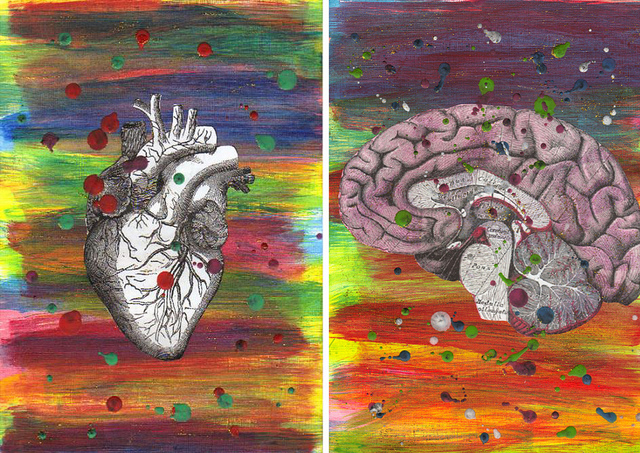Kurt Vonnegut, one of the best writers of any lifetime, once wrote a sentence that—if you recite it—can literally expand your capacity for experiencing and retaining happiness.
But before I give you that magical sentence from Mr. Vonnegut, let me share two memories.
Memory One: I was eight years old when my relative pinched my love handles and called me Porky Pig. I still remember how the room smelled (like honey-baked ham roasting in the oven), the time of day (4:35 p.m.), and what I was wearing (an Izod striped short-sleeve polo shirt that was way too tight for my chubby body). It was 33 years ago and I still feel the pinch of my relative’s fingers on my side.
Memory Two: The calling hours for my mother’s funeral. It was raining hard. I smelled the stench of people who had smoked cigarettes before entering the funeral home. How some eyes were filled with compassion and others’ were filled with dread—as if my mother’s death was a symbol of their own pending mortality. I was 14 years old when my mother died. It happened 27 years ago, but I am still shaking hands with family friends and acquaintances. I am still receiving kisses. Rain still drips onto my ill-fitting suit from grieving acquaintances who came in from the rain. I am still wondering how the hell I will live tomorrow without my mom.
These memories are decades ago but they’re still right in front of me.
But ask me about the beautiful experiences I had in the past week—the small and big moments—and my memories are fuzzy. Even though I’m intentional about remembering these things.
For example: I have a morning and evening ritual. Each morning I write down 10 things I’m grateful for. Each evening I write down 10 “wins”—awesome moments, little victories in my life.
But sometimes I just sit there, full of blankness, forcing my mind to scan the day for those moments I can use for my ledger of gratitude and happiness.
Those moments of happiness are there. Those moments of bliss fill even my lousiest days.
But it can be hard work to remember the good things.
And yet the bad moments are vivid, multi-dimensional: still living and pulsing inside me.
I know I’m not alone.
Neuropsychologist Rick Hanson, author of Hardwiring Happiness: The New Brain Science of Contentment, Calm and Confidence, explains that our brains are like velcro for negative experiences and teflon for positive experiences. Positive and negative emotions use different memory systems in the brain. According to Hanson, positive emotions don’t transfer as easily to long-term memory the way bad emotions do.
Which brings us to Mr. Vonnegut and that magical sentence.
I remember reading a Vonnegut essay where he told a story about his uncle who encouraged Kurt to take in the good moments.
Vonnegut writes, quoting his uncle: “I urge you to please notice when you are happy, and exclaim or murmur or think at some point, ‘If this isn’t nice, I don’t know what is.’”
If this isn’t nice, I don’t know what is.
Hell, yeah!
In his book, Dr. Hanson says that most of us don’t stay with positive experiences long enough for them to be “encoded” into our brain’s neural structure.
He goes on to say: “The longer the (brain cell) neurons fire, the more of them that fire, and the more intensely they fire, the more they’re going to wire that inner strength—that happiness, gratitude, feeling confident, feeling successful, feeling loved and lovable.”
In other words, if you let a moment of happiness pass without being intentional about taking it in, it won’t stay with you.
Which is why Vonnegut’s advice is so profound: stop in the moment of your bliss and acknowledge it.
“If this isn’t nice, I don’t know what is.”
Yesterday it rained. It’s been raining every day here in Virginia going on a month. Rain gets me down. Work has been stressful, which gets me down. I’m an ambitious dude who wants to help others go beyond their limits, and yesterday I felt like I was retreating back into my own comfort zone. That got me down.
Then I went into Target to buy socks and wine.
The young female cashier scanned my socks and wine. The computer prompted her to input my birthdate. Instead of asking for my ID, she made up a birthdate for me and punched it in.
And—get this—she was within a few days of being exactly right about my date of birth!
“Wow,” I said, a smile on my face. “I’m impressed. You have a gift.” I explained how uncanny her guess at my birthdate was. She smiled back and said that the other day she had almost perfectly guessed another shopper’s birthdate.
I encouraged her to play the lottery—and let me know which numbers she decided to play. We laughed, I took my bag of socks and wine and left the store.
I got into my car and sat there, remembering the encounter.
The young woman’s smiling face.
The smell of popcorn at the concession stand.
Our laughter. My amazement. She made me feel good. I made her feel good. It was a shared moment of bliss.
I said aloud: “If this isn’t nice, I don’t know what is.”
I took it in.
Life has a way of beating us up. It rains. Work can suck. You don’t get what you want. People hurt you. People leave you. People squeeze your fat rolls and remind you of your weight problem.
Then there are the other moments, which happen more than I sometimes remember.
A kind exchange with a stranger. Your cat looking at you like you’re both amazing and a dummy. A meeting with a co-worker that turns into a magical brainstorm session where everything is possible.
I don’t know if Mr. Vonnegut knew the science behind why our brains are like velcro for negative experiences and like teflon for good experiences.
But he was right.
Inhale the fragrance. Take it in. Receive the gift.
Remind yourself: “If this isn’t nice, I don’t know what is.”









Read 67 comments and reply